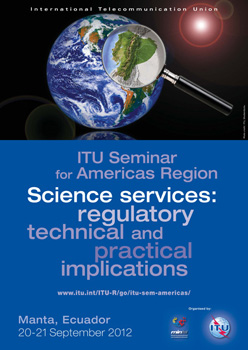| Historically, on account of their specificity, the development of science services has remained the preserve of a narrow circle of specialists. This stems primarily from the fact that the main users have been various security agencies or scientific institutions dealing with the fundamentals of space and the Earth. However, as a result of technological development in this sphere, science services are giving rise to a large number of applications for which there is significant demand, as they are extremely important, if not indispensable, in humankind's quest, for example, to combat various natural and climatic disasters and mitigate their effects. The World Radiocommunication Conference 2012 stated that "the collection and exchange of Earth observation data are essential for maintaining and improving the accuracy of weather forecasts that contribute to the protection of life and preservation of property throughout the world". At the same time, more and more applications, such as remote sensing imagery products, are emerging in response to commercial demands. Space research has become something utterly commonplace, yet space remains one of the most promising and exciting areas of human discovery. It is clear that the future of humankind, our ambitious goals and our plans depend more on what we achieve in space exploration than in any other branch of science. Technological development in general, and that of information/communication and navigation technologies in particular, requires the increasingly precise timing and synchronization of different electronic devices. Precise timing is no longer a novelty but a necessity. In particular, time and frequency transfer plays a critical role in the functioning of the Global Navigation Satellite System, and in turn is greatly enhanced by worldwide acceptance of the system. Astronomy provides the framework knowledge of where we, and the planet on which we live, fit into the environment of the Universe; astronomy is a vital part of the culture of all mankind. From the dawn of civilization, astronomy has provided important stepping-stones for human progress. Much of today´s mathematics, such as trigonometry, logarithms and calculus, interferometry, computed tomography, geodesy principles, is the result of astronomical research. Radio astronomy is an integral part of astronomical research and provides information that is complementary to astronomical research at all other wavelengths. This ITU seminar will provide participants with full and comprehensive information on the development of science services, focusing on the most recent studies conducted by ITU-R Study Group 7. In particular, the following items will be discussed: - International spectrum management frameworks for science services;
- Development of radio services related to Earth observation systems, including basic definitions, technical principles underlying the operation of systems and their main applications;
- A general understanding of the space research service, including the technical and spectrum requirements to support the many different space research programmes, missions and activities;
- A description of currently used and discussed precise frequency and time standards, sources and their characteristics, time scales and dissemination systems;
- The main aspects of radio astronomy relevant to radio spectrum use.
The seminar is intended primarily for the managerial and technical staff of State radiocommunication authorities involved in spectrum management matters. It may also be enlightening for a secondary audience, namely space agencies, national emergency, national security, law enforcement, aviation, maritime and meteorological organizations, in providing them with an understanding of some of the regulatory, technical and practical aspects of science services development. |





